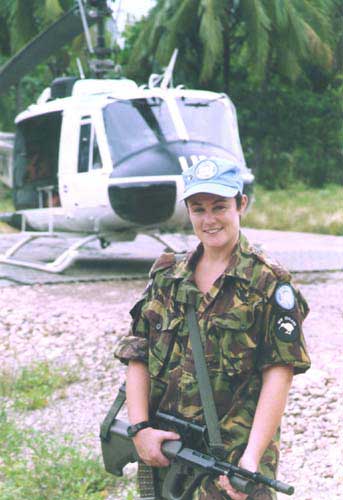|
|
|
Organised
Mayhem In Timor Many of the remainder would like to return but are prevented from doing so by the militias who dominate the camps. Others are uncertain because of false rumours deliberately spread about how bad conditions are in their homeland, including wild allegations of misconduct by the 8,000 UN peacekeepers who are combating militia attempts to infiltrate across the border. Some refugees are afraid to return because of their role in the post-plebiscite violence. The situation in the camps has similarities with the former Rwandan refugee camps in the Congo, which were dominated by Hutus who had taken part in or supported the genocide against Tutsis and moderate Hutus. The impasse then was finally broken by the Rwandan army - which crossed the border into Congo, releasing a human tide of returning refugees. Dire forecasts were made of a humanitarian catastrophe as tens of thousands of people set off for home on foot. But as so often happens when "authority" evaporates and people are left to their own devices, the return was remarkably orderly. Now the UN refugee agency, UNHCR, is again confronted with the problem of refugees being terrorised by militia, who refuse to accept the results of the UN-organised plebiscite, which they claim was rigged. Sooner or later, UNHCR will have to formulate a policy for dealing with such situations, which will certainly recur elsewhere in the world. The situation on the border of Timor is further complicated by the issue of bringing to justice those responsible for the 1999 violence. Well-known militia leaders, who openly led their murderous gangs in East Timor before and after the referendum - believing they could act with impunity - are still strutting around in public in West Timor, some of them armed. Indonesia has failed to deal with them, though it recently said it would close the camps within months, which may have increased the desperation of the militia leaders. And there is strong circumstantial evidence that elements in the army are actively supporting the cross-border incursions, which have resulted in the deaths of UN peacekeepers. The Indonesian government is struggling with enormous political problems of its own - including its perceived weakness - and the government clearly feels it has to tread carefully in reining in the wilder sections of the once all-powerful armed forces. But if outrage over Wednesday's attacks results in more consistent pressure on Jakarta to tackle the refugee situation in Timor and bring militia leaders to book, then all those killed and injured so far will not have suffered entirely in vain. Promises have been made by the Indonesian President, so far that's all that has been made. Relying on Indonesia to bring democracy and justice to Timor has to be seen as a political betrayal of all the East Timorese and West who seek a peaceful elected governance. The lives of UN staff are also being played with. Yet again the UN holds a talk-fest (Millenium Summit) while its workers die..n end to poverty. These foot-soldiers are mobilisi |

